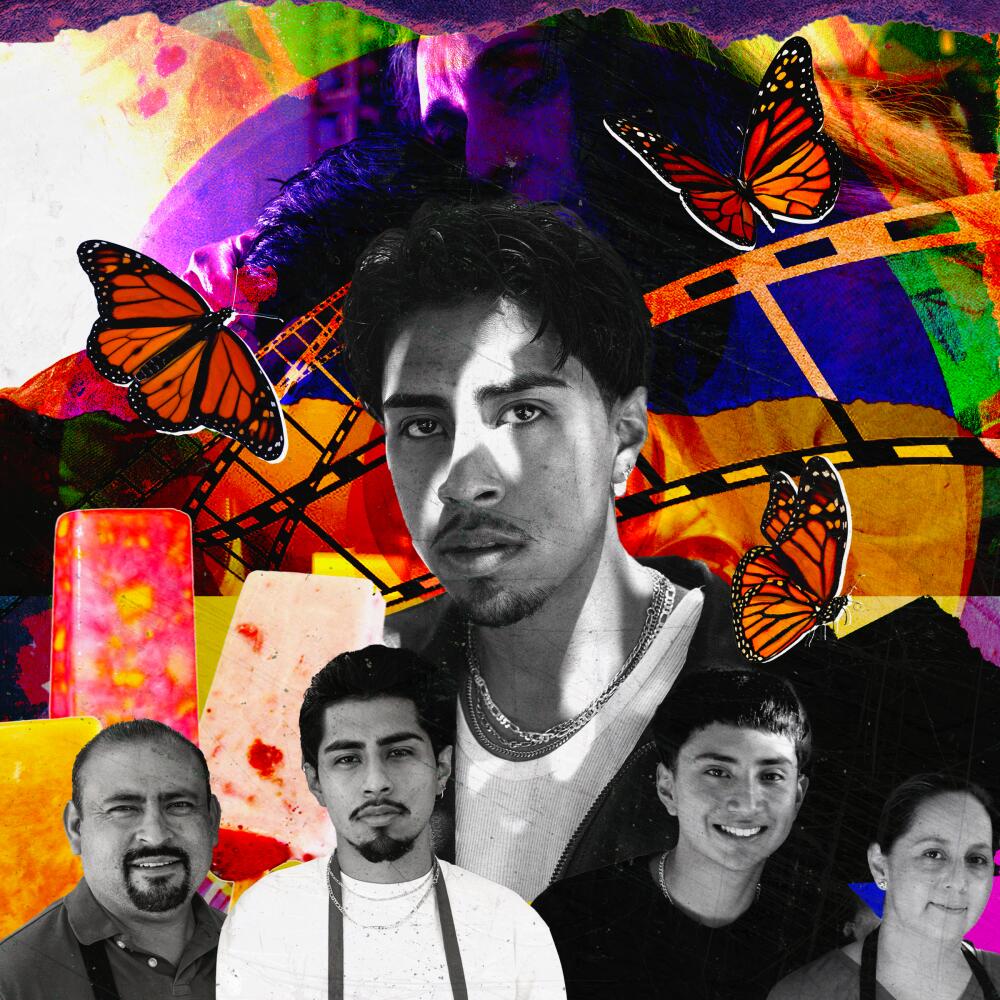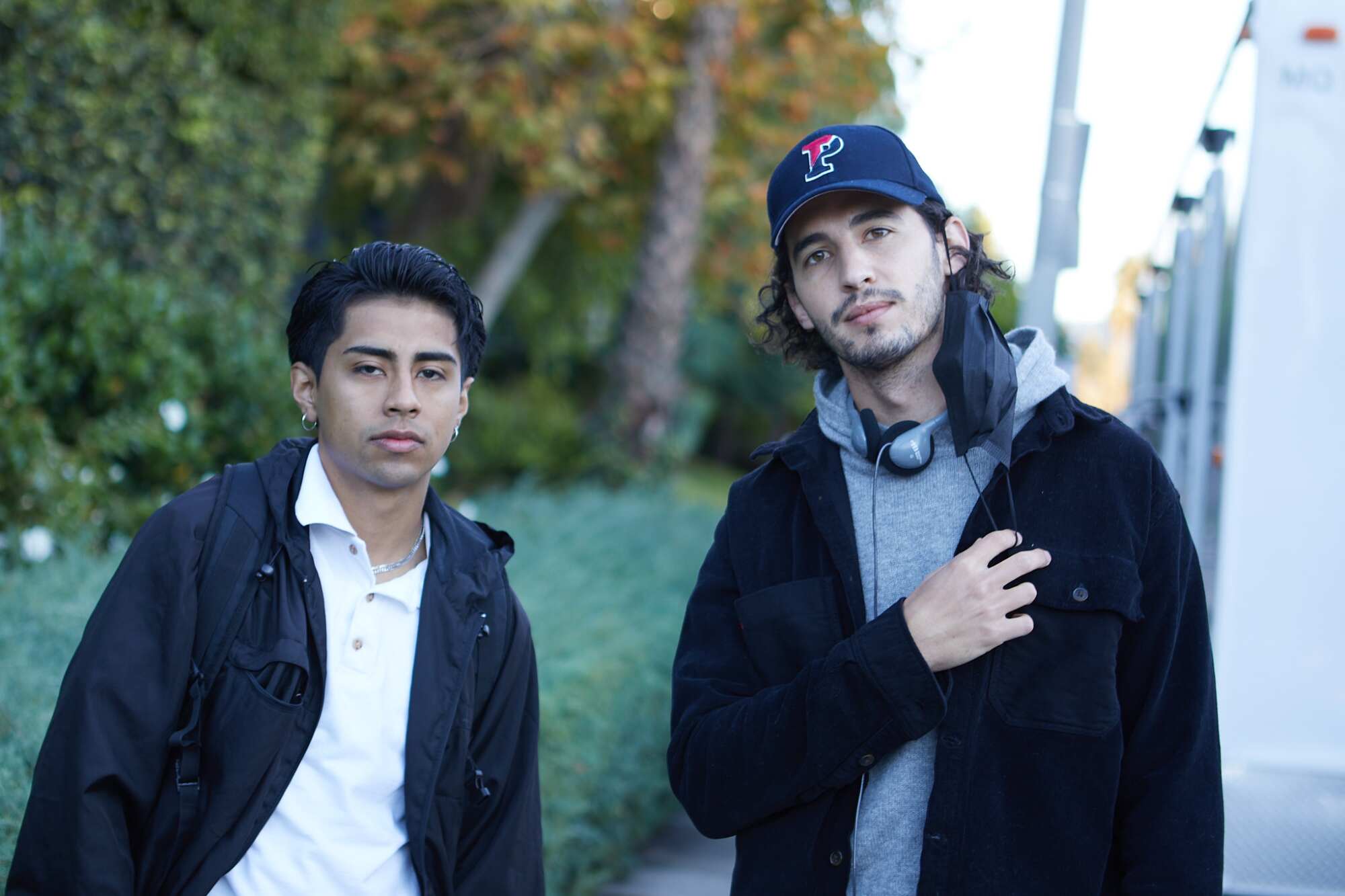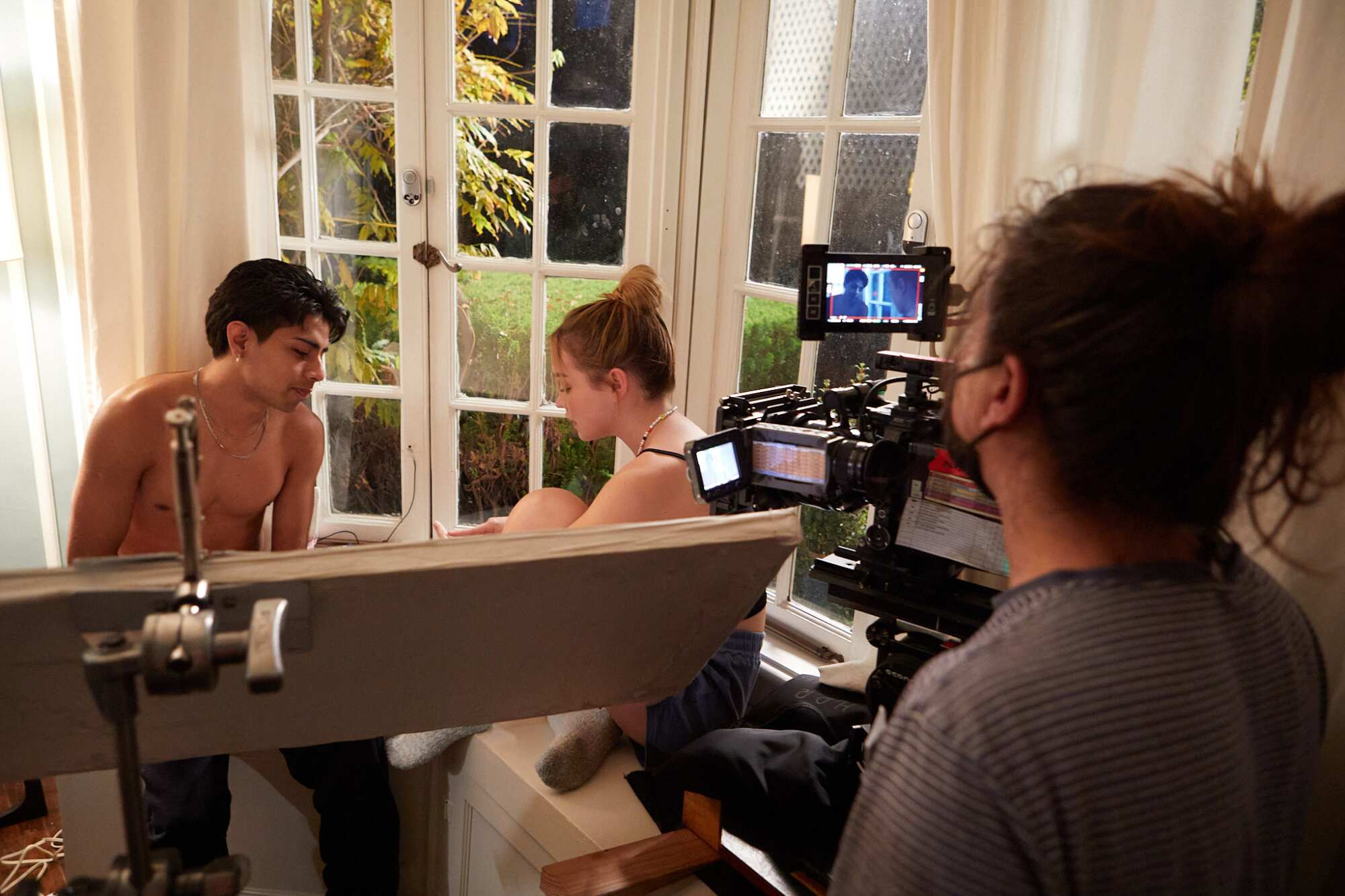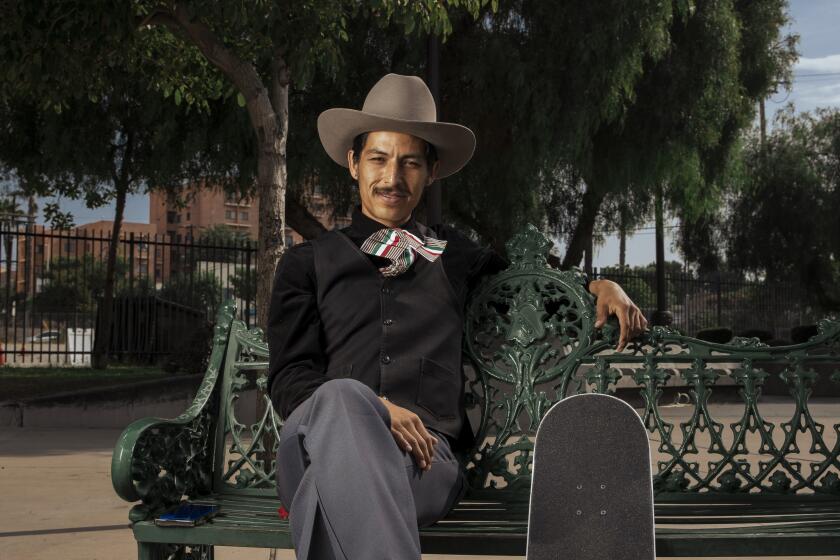
Most weekends you can find Ezekiel Pacheco working at JK Snack Shop in Watts. His parents, Ezequiel Pacheco and Veronica Morales, started the small business, dishing out everything from biónicos to hot food, after years working as paleteros on the streets of Los Angeles.
But over the last two weeks, Pacheco, 26, has been busy with a different passion project: promoting the thriller “At the Gates,” the first feature from writer-director Augustus Bernstein, where he stars in a bilingual role as a young unauthorized immigrant hiding from Immigration and Customs Enforcement with his housekeeper mother inside the home of her wealthy white employers.
“I’ve gone from selling ice cream, to cooking chicken with my family — and I’m still working with them to this day — to now making movies and being a lead,” Pacheco said during a recent video interview from New York City, where he was for the film’s theatrical release.
A Deferred Action for Childhood Arrivals (DACA) recipient from a humble background, Pacheco’s story bears striking resemblance to that of Nico, his character in “At the Gates.” Born in Ayutla de los Libres, a town in the Mexican state of Guerrero, Pacheco was brought to the U.S. at the age of 1. Having only known Watts as his home, learning of his unauthorized status shocked him as a child.
Steve Corona is a Los Angeles skater who has gone viral on Instagram thanks to videos that show him dressed in what he calls his ‘Pati-Charro’ aesthetic.
“My parents said, ‘You weren’t born in the United States. You were born in Guerrero.’ I was like, ‘What are you talking about?’ I asked, ‘So when can we go see my home?’ They said, ‘You can’t, you don’t have papers,’ ” he recalled. “I thought, ‘What does that even mean?’ ”
The family lost their home to financial hardship when Pacheco was in the seventh grade. For a long time, he admits, being ashamed of their circumstances deeply affected him.
“Being poor made me really insecure growing up, but now I have a story to tell,” said Pacheco, who eventually found his confidence playing football. “I was the smallest on the team, but I was always the biggest dog. I didn’t let my heart get broken by any adversity.”
Growing up, Pacheco had no intention of becoming a performer. Acting found him at 19 via an advertisement for AGB Studios, an acting academy based in Glendale, his parents heard on the radio. They first enrolled his younger brother Kenny, since Pacheco had aged out of the program. But ultimately the head of the school made an exception and admitted him.
Who are we protecting when we pretend white people don’t sometimes say wildly offensive things about people of color? It’s certainly not us.
That twist of fate, among others in his short career, convinced him acting is his calling.
“God has walked with me everywhere. I’m going to keep walking with him to the top,” he said. “Acting just came to me really easy because after so much trauma, this to me feels like one of the biggest privileges in the world.”
With time, and after several other training programs, Pacheco landed a job acting in scenes at the Sundance Directors Lab, the annual program the Sundance Institute holds in Utah for emerging filmmakers to hone their craft. To get there, he got on his first-ever flight.
There, Pacheco met one of his most treasured mentors, Oscar-nominated actor Ed Harris. Since then, the Hollywood veteran has become an endless source of encouragement and professional advice for the burgeoning thespian. Harris’ trust in Pacheco’s talent is such that he sponsored him to attend the Imagined Life acting school to continue his education.
According to the recent report from the Annenberg Inclusion Initiative at USC, Latino representation in Hollywood has not shown any meaningful growth in the last 16 years.
“[Ed] puts so much confidence in me that I feel no pressure when I’m doing these things,” he said. “If someone like that believes in me, I have no choice but to believe in myself.”
Pacheco had his first taste of success after booking a supporting role on the Netflix series “On My Block.” But just as he started to build momentum, the lack of acting opportunities due to the COVID-19 pandemic forced him to get a job delivering packages for Amazon.
“It was a very humbling time for me that I’m very grateful for because now I’m able to see through the veil of everything and not be trapped by the dopamine of fame,” he said.
It was during one of his shifts for Amazon that Pacheco received the email informing him he’d gotten the lead role in “At the Gates.” Though Bernstein didn’t explicitly set out to cast an actor who so closely related to the plight of the protagonist in his screenplay, finding Pacheco enriched the production not only with his dramatic skills but also sincerity.

“His lived experience was more than a part of his character; it ended up being the soul of the project,” said the director. “His involvement allowed us to discuss American policies in even greater depth and humanized the challenges that many children in our country face.”
Pacheco plays Nico with an admirable inner resolve. While the white family sheltering him and his mother, Ana (actress Vanessa Benavente), demand their gratitude, Nico questions their intentions for helping and defies the submissiveness that’s expected of him.
“That’s why it was so important to find an actor like Ezekiel who is bursting with a powerful dignity and is demanding more for his future,” Bernstein noted. “He’s not held in a box by the words on a page. At any moment, he could do something wild and magical.”
In addition to the emotional complexity of the part, Pacheco also relished the chance to act in two languages through dialogue that felt more authentic than in previous experiences.

“I had a great time speaking Spanish on ‘At the Gates’ because none of it was stereotyped. I didn’t drop Spanish just to drop Spanish like Hollywood forces us to do,” Pacheco explained. “I was able to truly speak English and truly speak Spanish.”
Pacheco’s parents and relatives were in the audience at a recent screening of “At the Gates” in L.A. During the post-film Q&A, the young actor was visibly overwhelmed with emotion.
“I’ve seen my parents suffer so much, so when I saw them watching my movie the tears got me over,” he said. “I’m in such a rush to help out my parents financially and to get them a house. I’ve never had a room to myself. Me and my brother still share a room.”
Despite his personal challenges, Pacheco moves through every new opportunity with the unwavering conviction that he won’t fizzle out but instead attain long-lasting success, not only to make his parents proud and inspire others like him, but to leave behind a legacy.
“I don’t like having mental boundaries in me because you are what you think, and I believe I’m going to be great,” Pacheco said. “There’s nothing wrong with thinking that way.”
More to Read
The Latinx experience chronicled
Get the Latinx Files newsletter for stories that capture the multitudes within our communities.
You may occasionally receive promotional content from the Los Angeles Times.









